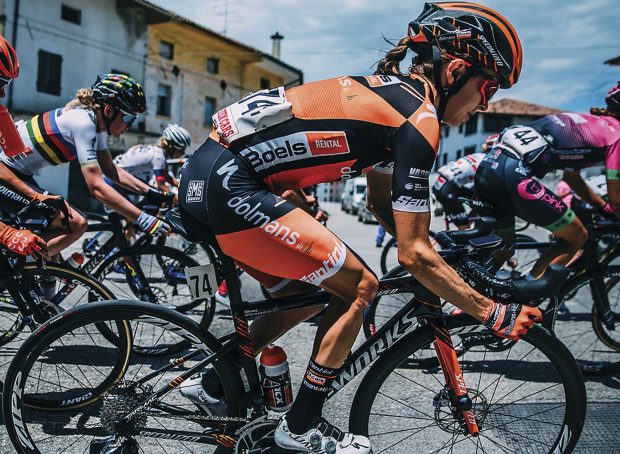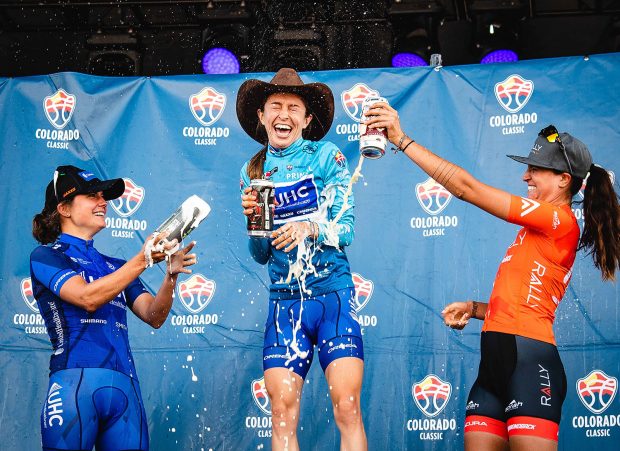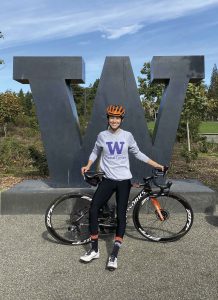
Katie Hall rides down a street in Italy during the Giro d’Italia. —Photo by Tornanti.cc
It was now several years ago, but Katie Hall remembers the enchantment of her first Giro d’Italia in vivid detail and bright colors.
The “Giro Rosa” as it’s usually known in cycling circles, is essentially the women’s Tour de France. Its competitors endure a brutal but beautiful 600-plus-mile, 10-day stage race through the muted browns and greens of central Italy. But mostly what Hall remembers is the pink.
The race route winds through some of Italy’s most scenic landscapes, landing in bustling plazas festooned in blush-colored garlands. “It’s beautiful,” Hall says. “You ride through these ancient town squares with pink ribbons everywhere and pink umbrellas hanging above.” (“Rosa” means pink in Italian; the race gets its name from the pink-papered newspaper that originally sponsored it.)
Although she was a self-described “pretty active kid” who played a lot of sports growing up, Hall’s childhood in Seattle was not one that necessarily foretold achievements in elite athletics like the Giro Rosa. “I was pretty bookish—one would maybe even say nerdy,” she says. And although she learned to ride a bike fairly early on, she didn’t even own one for most of her teenage years. “It wasn’t on my radar at all,” she says.
Nevertheless, Hall eventually found her way to Italy and the world of professional cycling. The competition there was fierce; women’s cycling races are often more intense than men’s because they’re shorter, she says. “There’s a lot of excitement and drama in it; it’s a really beautiful sport.”
Now, she counts her experiences there among her favorite memories in an unlikely but successful career in pro bicycling. After putting aside previous plans to study physical therapy to become a professional cyclist in 2013, Hall pivoted again in 2020 as the world changed around her. Despite being long-listed for the ill-fated Tokyo Olympics, she made the difficult choice to walk away from a seven-year adventure in pro sports and pursue a career she sees as more meaningful—one that has redefined her relationship with her body and her community.
Hall majored in chemistry at Pomona and for a while thought she might go into public health research. Her college years were also when bicycles reentered her life, though for the moment in a purely pragmatic role: She rented a house in Seattle with classmates one summer and bicycle-commuted to an internship in Redmond, 25 miles away. But long-distance bicycling didn’t come easily at first. “I would come from work and lie on my living room floor, and people would throw snacks at me,” she says. “I was destroyed.”
After graduation, Hall began a Ph.D. program at the University of California, Berkeley, bike racing on the side in the hope of making friends who shared her interests. After a brief and disastrous stint on a mountain bike—“It was terrifying, and I was basically last in everything I did”—she found her niche in road races. Here, finally, was something she was good at and loved. She competed in the National Championships her first year.
At the same time that she was discovering cycling, Hall was also learning what she didn’t love: spending all her time in a laboratory. She found the windowless basement workplaces stifling; the slow pace made her antsy. And there were too many steps between her work and the positive impact she hoped to have on society. Searching for a better option, she started observing in physical therapy clinics, a setting where she could work with people face-to-face and see immediately how her work impacted them.
But then, after a stint on the collegiate all-stars biking team, she was offered a professional contract on a team sponsored by the health insurance company UnitedHealthcare. It was a “now or never” opportunity, she thought, an adventure that would get her out of the windowless basement. Why not try it for a year for two?
She never expected to stay for seven.

Katie Hall celebrates her win in the 2018 Colorado Classic. —Photo by Jonathan Devich
One of the best parts of being a professional bicyclist, Hall says, is the free time. A person simply cannot train for 40 hours a week without injury, a limitation that left space for a multitude of hobbies and a leisurely pace. And bicycling brought Hall not just to Italy for the Giro Rosa but all over Europe; her last two years she lived in Spain half time. When she wasn’t training, she could explore, cook, relax. When she was on the clock, she could hone her skills at something she loved, along with an international coterie of people who cared about the thing she cared about and who were really, really good at it.
Plus, it felt great to win, and for someone who found the sport relatively late in life, Hall won a lot. She counts her win at the Tour of California on the Women’s World Tour in 2018 as her biggest cycling achievement. She’d already lost narrowly twice in the race, the year before by only a second to the reigning Olympic champion. That made her 2018 victory all the sweeter, a culmination of four years of tough and determined work.
It was work, even if it was also fun. The constant training could be depleting, and she couldn’t let herself have an off day. Being on the road got lonely at times, especially because her husband’s job meant they were separated for long stretches. And the pressure could really get to her. In bicycling, “there are 200 starters and one winner,” Hall says. Not winning meant letting her team down, especially once she took on the role of team leader at UHC. “You have five other people putting their whole heart and soul and faith in you,” she says. “And if you let them down, it feels bad!”
After five years on the team, the highs and lows started to wear on her. She’d won all the major races in America; she’d had her vindicating moment at the Tour of California. Her mind again drifted toward physical therapy. She even applied to some graduate programs.
But then the phone rang again. This time it was Boels-Dolmans, one of the best teams in Europe. European cycling was a rarified world, one she’d been intimidated by until now. Her teammates would be the Olympic champion, the world champion, and their respective runner-ups. Again she took a chance; again she seized the moment. “This is this adventure I’m having right now, and then I’m going to go back and work a job,” she thought to herself. “So, why not ride my bike around the world?”
Like many people, Hall says ruefully, “I had this really nice and tidy plan before pandemic.” She’d trained all year with her new teammates. On a high from her recent successes, she found herself on a long-list for the American Olympic team, slated to compete in Tokyo in August 2020. The last race of the year would be the World Championships, on September 26. Her physical therapy graduate school program at the University of Washington started on September 29. She’d use that weekend to move to Seattle and start a new life. Easy!
But, as happened with so many 2020 goals, the universe had other plans. Though races started getting canceled in early spring, Hall kept training, never knowing which might go forward and which might not. Then, when she flew home to California for three weeks for a planned trip, she simply never flew back.
Suddenly back in the U.S. and unsure when things might get back to normal, she struggled to keep training at home, fitting in interval sessions and “bikepacking” trips with friends around the more standard baking projects and TV binges. That’s also how she ended up setting a brief world record “Everesting” a hill in her neighborhood—a niche bicycling sport that involves traversing a hill enough times to equal the height of Mount Everest. In this case, that hill was Bonny Doon in Santa Cruz, California; Hall biked up and down it 28 times in just over 10 hours, as part of a fundraiser for COVID-19 relief. Though her record was quickly beaten by other cyclists, she still thinks of the experience as a highlight of 2020. “It felt like something I could do,” she says.
As the pandemic stretched on and professional bicycling didn’t come back to life, Hall had to make a tough choice: Should she keep pushing at training, preparing for eventual races and maybe the Olympics? Or should she finally do what she had always intended and start a new life as a physical therapist? Her announcement that she would retire surprised many in the bicycling world. She seemed to be at the top of her game. How could she walk away now?
But the year, unexpected as it was, had presented an opportunity for reflection, she says. Living through a global pandemic reminded her of her original goal to help people. She saw that with bicycling shut down, “the world wasn’t worse off. I wanted to have a job where, if we stop doing it, it matters.”
Walking away from even the possibility of the Olympics was difficult, but Hall downplays what she calls the “slimmest chance” that she might have competed, considering the other cyclists sharing space on the long-list. Instead, what she takes away is the achievement of being included at all. “It was a huge honor to be on that list and really cool to think about how far I’ve come in cycling,” she says.

Katie Hall poses with her bike on the campus of the University of Washington.
So it was that Hall packed up her things and became a full-time student at the University of Washington in September 2020, attending in-person classes three days a week. “I’m really grateful for how they’re navigating the COVID measures so far,” she says. “It’s such a physical thing; it’s in the name. It would be really hard to learn entirely online.”
Aside from the changes in career and continent, her biggest challenge has been “transitioning from body to brain,” from several hours a day out in the sunshine to what can feel like eons in front of a computer or buried in books. Now there’s homework to be done and anatomy to be learned; this semester she’s excited to move from the extremities to the spine and trunk. Sometimes if she’s too antsy, she’ll ride her exercise bike while she watches lectures. And she calls spending time in the cadaver lab “mind-blowingly cool.” (Plus, now she gets to ride her bike purely for the pleasure of it. “It’s a refreshing feeling to not be so tired from training and be excited to get out every single time,” she says.)
Studying physical therapy is also giving her a profound new perspective on bodies—both hers and others’. For seven years, she worked on getting as good as she could at a specific movement, an endeavor that necessitated concentrating deeply on herself. When she wasn’t training, she was thinking about training, or thinking about how to think about training: how to be “1% better at pedaling,” how to organize her workouts, how to recover after difficult sessions.
“It’s a pretty self-centered career,” she says. “To be good, you have to really focus on your recovery, your nutrition, your sleep quality.” She appreciates that physical therapy will allow her to work and think more about other people and how to help them achieve their goals. “My goals were pretty elite-level movement,” she says, and figuring out how to do that movement without pain. She can apply that to helping even her patients who are just trying to make it through the day.
That’s gotten her started thinking about how she’d like to focus in her future career as well. She came in with the idea that she’d want to work with endurance athletes, drawing on her personal experience to help them reach the top of their sports. But the more she learns, the more she wants to learn. Maybe acute care could be a good fit; maybe women’s health work would be fulfilling.
She sees this adjustment as just another step in the flexible, elastic path that’s led her here. Olympics or no Olympics, she says, physical therapy is not a rebound but rather an organic and long-awaited step in a life that’s had its share of unexpected detours. “Cycling was not ever a career I was going to be able to do forever,” she says. All cyclists, no matter how talented, need another plan, and this is hers. “I’m really excited about where I am,” she says. “I feel like I’m in the right place.”
